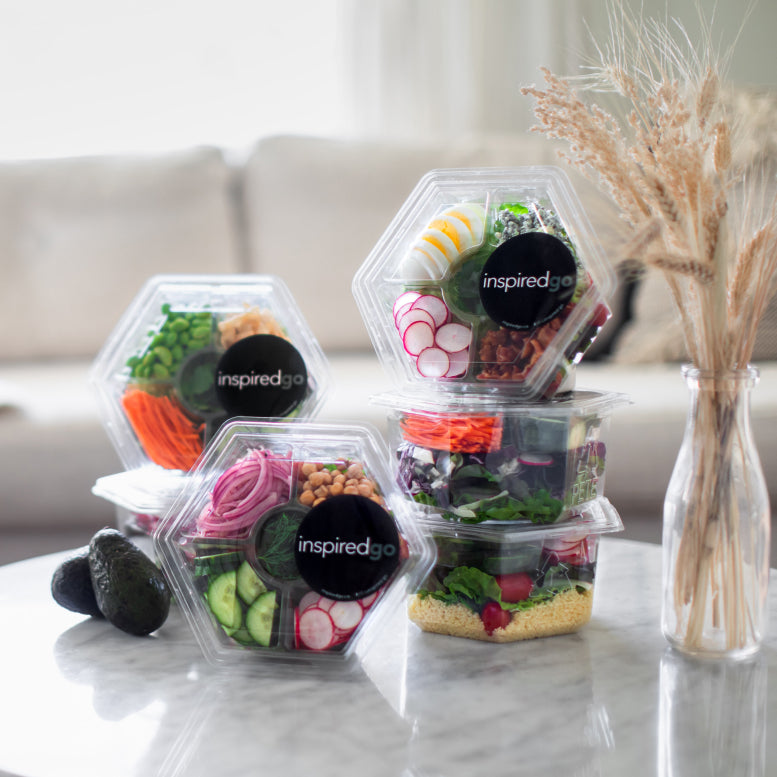What Keto Salads Can I Eat On A Ketogenic Diet?
Table of Contents
1. Exploring Keto-Friendly Salads for a Ketogenic Diet
2. How Many Carbs Are in a Typical Keto Salad?
3. Are Keto Salads Nutritionally Balanced?
4. How Can Inspired Go Support Your Keto Journey?
1. Exploring Keto-Friendly Salads for a Ketogenic Diet
Embarking on a ketogenic diet necessitates a careful selection of food that aligns with your dietary needs. Keto-friendly salads are an excellent choice, providing the low-carb, high-fat content ideal for this diet. Consider salads that feature lean proteins, healthy fats, and nutrient-dense veggies. For example, the Everything Bagel Salad offers a delightful blend of smoked salmon, cream cheese, cucumber, and capers, providing a rich source of protein and healthy fats. Alternatively, opt for the Roasted Fall Bowl, a hearty combination of roasted vegetables, seeds, and a generous drizzle of olive oil, offering a balance of essential nutrients without exceeding your carbohydrate limit. Remember, maintaining a varied diet is key to meeting your nutritional needs, so don't hesitate to explore different salads and ingredients that adhere to your ketogenic lifestyle.
Order fresh salads today →


2. How Many Carbs Are in a Typical Keto Salad?
The carbohydrate content of a keto salad varies depending on ingredients and portion size, but most are designed to stay under 10–15 grams of net carbs per serving. A salad built on leafy greens with proteins like chicken, paired with high-fat toppings like avocado, nuts, and cheese, typically contains minimal carbohydrates. Choosing low-carb dressings, such as vinaigrettes made with olive oil or sugar-free creamy blends, helps keep the meal keto-compliant. Pre-portioned keto salads from delivery services make it easy to stay within carb limits without constant tracking or weighing of ingredients. Nutritional labels provide transparency, giving you confidence that your salad supports your ketogenic goals. This makes keto salads a convenient, satisfying choice for anyone seeking to manage carbs while enjoying fresh, flavorful meals.
Choose your salads and schedule delivery →
3. Are Keto Salads Nutritionally Balanced?
Keto salads are carefully designed to provide more than just low carbohydrates, they offer a full spectrum of essential nutrients for overall health. Leafy greens deliver vitamins A, C, and K, while proteins like grilled chicken provide amino acids for muscle maintenance. Healthy fats from avocados, olives, nuts, and cheese supply sustained energy, support brain function, and help absorb fat-soluble vitamins. Keto salads also include fiber-rich vegetables that aid digestion and keep you feeling satisfied. Meal delivery services that specialize in salads craft keto-friendly options under the guidance of dietitians, ensuring every meal meets macronutrient needs without unnecessary additives or sugars. This makes keto salads a practical choice for balanced eating, supporting both short-term energy and long-term wellness.
Get fresh salads and snacks delivered →
4. How Can Inspired Go Support Your Keto Journey?
Maintaining a ketogenic lifestyle can feel overwhelming without the right food options, which is why Inspired Go creates keto salads that take the stress out of meal planning. Our salads provide carefully balanced macros to keep you in ketosis, made with fresh, high-quality ingredients that taste great and fuel your day. Whether you’re new to keto or maintaining long-term goals, our ready-to-eat salads deliver convenience and consistency you can rely on. With rotating menu options and precise nutritional details, Inspired Go helps you stay on track without the burden of cooking, tracking, or compromising on flavor. We make it simple to stick to your plan, giving you confidence that every meal supports both your diet and your lifestyle. Let Inspired Go handle the hard part—so you can focus on results, not restrictions.
Try our fresh, ready-to-eat salads →
Frequently Asked Questions
The most nutritious salad greens are dark leafy varieties like spinach, kale, and arugula. These greens are packed with essential vitamins, including A, C, and K, as well as minerals like calcium and iron. Kale is particularly rich in antioxidants, while spinach offers significant amounts of folate and magnesium. Choosing a mix of dark greens enhances both the flavor and nutritional value of your salad.
A healthy salad includes a balance of nutrient-dense ingredients like leafy greens, fresh vegetables, lean proteins, and healthy fats. For example, a base of spinach and kale, paired with grilled chicken, cherry tomatoes, avocado, and a light olive oil dressing, creates a wholesome meal. Avoid fried toppings or sugary dressings, as they add empty calories, and opt for natural ingredients to maximize nutrition.
Yes, eating salad daily is a healthy habit when it includes a variety of fresh, nutrient-rich ingredients. Salads offer fiber for digestion, antioxidants for immunity, and essential nutrients like potassium and folate. Regularly eating salads can support weight management and improve energy levels. To avoid monotony, vary your greens, proteins, and toppings to keep meals satisfying and nutritionally balanced.
Healthy salad dressings are typically made with simple, natural ingredients. Olive oil-based dressings, paired with balsamic vinegar or fresh lemon juice, provide healthy fats and enhance flavor without unnecessary calories. Avoid store-bought dressings with high sugar or preservatives. For a creamy alternative, opt for homemade dressings using Greek yogurt or avocado for added nutritional benefits.
Yes, salads are incredibly beneficial for overall health when prepared with fresh, whole ingredients. They are low in calories and high in vitamins, minerals, and antioxidants, supporting heart health, digestion, and immunity. Adding a mix of proteins and healthy fats creates a satisfying, nutrient-dense meal. Regularly incorporating salads into your diet can promote long-term well-being and energy.

